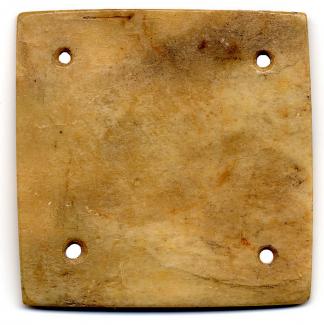Bone weaving tablet
Roman
Found during excavations by Winchester Museums Service Archaeology Section at Victoria Road, Winchester in the mid- to late 1970s
Triangular and rectangular weaving tablets were used to produce braid, with a warp thread passed through the holes in the corners and fixed to a frame. The number of tablets used varied according to the width of the braid needed. A dump of partially-worked shoulder blades of cattle, the bones used to make such objects was found in 1974 at Crowder Terrace, suggesting that this particular tablet was made in Winchester.
It was discovered in the backfill of a well, along with a hoard of bronze coins, the latest dated AD 364, a shale spindlewhorl and a military buckle. At the time, the frontiers of the Roman empire were in turmoil due to repeated barbarian attacks. As none of these items was particularly valuable in itself, it may be that they were buried as a symbolic offering to the gods against the insecurity of the times, rather than just to hide them. The weaving equipment might even have symbolised protection for a woman's life, and the buckle protection for a man's.



